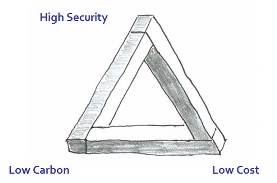Clean Heat Market Consultation
BEIS has published its Clean Heat Market Consultation and requests responses by 12 January 2022.
The consultation opens with the idea from The Heat and Buildings Strategy that there are several pathways to decarbonised heat by 2050.
It states the two main options as:
- widespread electrification of heating using heat pumps, or
- a potential programme to convert parts of the gas grid to hydrogen
It is surprising that BEIS still refers to hydrogen, because:
- blue hydrogen is incompatible with Net Zero
- burning green hydrogen from electrolysis would need five times as much electricity as using electricity in heat pumps directly
- burning hydrogen in air emits six times more NO2 than burning methane gas in air.
However, the oil and gas lobbying is so strong that BEIS feels obliged to say, “no one solution can provide the best option for everyone: a mix of technologies and customer options will be needed to decarbonise heat at scale”.
BEIS does note that “Heat pumps are the established mainstream consumer choice in other markets such as Sweden and Norway and increasingly so in France and Italy.” However, BEIS does not say why. The reason is that heat pumps are the cheapest route to heating in Sweden, where gas is heavily taxed. Gas boilers are the cheapest route to heating in the UK, where electricity is very heavily taxed.
The market speaks load and clear. It is time for Government to listen and act. It is time for the Treasury to reduce the 25.5% environmental levy on electricity that is preventing the installation of heat pumps in the UK. The levy on fossil gas is set at just 2.5%.
In the Clean Heat Market Consultation BEIS covers 25 pages discussing options for market-based interventions without mentioning the huge environmental levy on UK electricity. It does go as far as to say, “These proposals are aimed at addressing market failures that act as a barrier to the emergence of low-carbon technologies such as heat pumps on a competitive basis with established alternatives”, without mentioning the high tax on domestic electricity. The elephant in the room is airbrushed out.
Instead BEIS, in salute to Baldrick, has come up with a “cunning plan”. It is to “create an obligation on the manufacturers of fossil fuel gas and oil boilers to achieve the sale of a certain level of heat pumps proportional to their fossil fuel boiler sales in a given period”. We could debate the merits of this leap of the civil service into re-organising the industrial economy, but it is unlikely to interest the drinkers in the local pub. If, on the other hand, the Treasury were to load the tax on combating climate change on the burning of fossil fuels which cause it, then everyone in the pub would be interested to hear the alternative.
The only practical route to heat decarbonisation is to use heat pumps
Although the Consultation does eventually reach the conclusion that the only practical available route to heat decarbonisation is to use heat pumps, it does allow itself to be distracted into debating whether it should be incentivising high-temperature heat pumps as well as low temperature heat pumps – as if these were two separate species.
There is, in fact, no binary distinction between the two. A modern high-temperature heat pump is inverter-driven and can modulate down to provide lower temperatures when this is all that is required.
The principal aim of the legislation is to achieve decarbonisation of heat. A high-temperature heat pump provides a 100% carbon saving compared to using a gas boiler, if green electricity is used.
If grid electricity is used the carbon saving is 68% for a high-temperature heat pump and around 78% for a low-temperature heat pump. There can be very good reasons to use a high-temperature heat pump to decarbonise existing buildings in very cold conditions. The same heat pump can modulate down to producing lower temperatures when warmer conditions allow.

The carbon savings of using a high-temperature heat pump are dramatic compared to using a gas boiler. BEIS should not seek to treat high-temperature heat pumps in a different way to low-temperature heat pump: there is already a very good market reason for buildings to use lower temperatures for heating where this is compatible with providing sufficient heat: this uses less electricity.
Barriers to the electrification of heat in UK
The UK Treasury's "social and environmental levy" on electricity is the chief market barrier to decarbonising heating in the UK: spark gap.
See Low Carbon Heating See Low Carbon Cooling See Ground Source Energy

